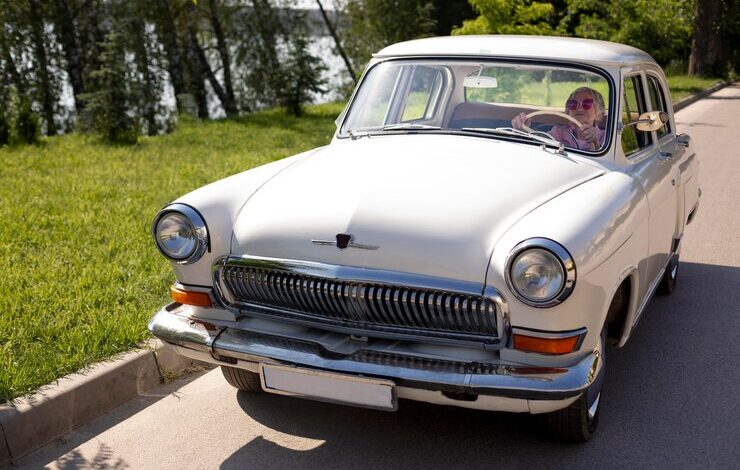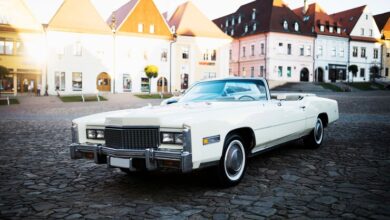https://guia-automovil.com/2020/10/07/los-3-mejores-autos-clasicos-de-ford

In the bustling world of modern vehicles, there’s something uniquely captivating about classic cars. These timeless machines transport us to an era where elegance and innovation came together to create automotive legends. Among these revered classics, Ford has made an indelible mark with its iconic models. This post will take you on a nostalgic ride through the top classic Ford cars, their history, and what makes them so special.
The Allure of Classic Cars
Classic cars hold a special place in the hearts of automotive enthusiasts. They are more than just vehicles; they are rolling pieces of history that tell stories of innovation, design, and culture. For many, owning a classic car is akin to owning a piece of art. Ford, a pioneer in the automotive industry, has produced some of the most memorable and influential classic cars.
What is a Classic Car?
A classic car is typically defined as a vehicle that is at least 20-30 years old. These cars are often celebrated for their historical significance, unique design, and superior craftsmanship. Classic Ford cars, in particular, are renowned for their reliability, performance, and the nostalgia they evoke.
Ford’s Legendary Lineup
Ford’s legacy in the automotive world is unmatched. The company’s classic cars have not only stood the test of time but continue to be celebrated by enthusiasts and collectors alike. Let’s explore the top three classic Ford cars that have left an indelible mark on automotive history.
The Iconic Ford GT40
The Ford GT40 is a symbol of Ford’s dominance in endurance racing. Introduced in 1966, this supercar was built to rival Ferrari in the prestigious 24 Hours of Le Mans race. With its sleek design and powerful engine, the GT40 did not disappoint, securing multiple victories and cementing its place in racing history.
A Racing Legend
The GT40 was designed with one goal in mind – to win at Le Mans. It achieved this feat four consecutive times from 1966 to 1969, establishing Ford as a force to be reckoned with in the racing world.
Modern Iterations
In 2003, Ford reintroduced the GT with modern enhancements, capturing the spirit of the original while incorporating contemporary technology. The latest models continue to impress with their performance and design, making the GT a favorite among car enthusiasts.
Collectibility and Value
The original GT40s are highly sought after by collectors, often fetching millions at auctions. Their rich history and limited production numbers make them a prized possession for any classic car aficionado.
The Legendary Ford Mustang
The Ford Mustang needs no introduction. Since its debut in 1965, the Mustang has become an icon of American muscle cars. Its powerful performance, stylish design, and cultural impact have made it a legend in the automotive world.
Birth of a Legend
The Mustang was introduced as a “pony car,” a new class of American sports cars that combined performance and affordability. Its immediate success and enduring popularity have made it a symbol of American automotive prowess.
Evolution Over the Years
The Mustang has undergone numerous transformations over the years, each iteration retaining the core elements that made it famous. From classic models to modern high-performance versions, the Mustang continues to capture the imaginations of car lovers worldwide.
Mustang in Pop Culture
The Mustang has appeared in countless movies, TV shows, and songs, further embedding it in popular culture. Its iconic status ensures that it remains a beloved classic among enthusiasts and the general public alike.
The Revolutionary Ford Model T
The Ford Model T is perhaps the most significant car in automotive history. Introduced in 1908, it was the first car to be mass-produced using assembly line techniques. The Model T made car ownership accessible to the masses and changed the course of transportation forever.
An Automotive Pioneer
The Model T was revolutionary for its time, offering reliability, simplicity, and affordability. It was the first car to feature a left-hand steering wheel, which became the standard in the automotive industry.
Mass Production and Accessibility
Henry Ford’s innovative assembly line production method drastically reduced the cost of the Model T, making it affordable for the average American. This democratization of car ownership had a profound impact on society and the economy.
Enduring Legacy
Today, the Model T is celebrated as the car that put America on wheels. Its historical significance and innovative design make it a cherished classic for collectors and historians.
The Collector’s Market for Classic Ford Cars
The market for classic Ford cars is thriving, with enthusiasts willing to pay top dollar for well-preserved models. Collecting these classics is not just about owning a piece of history; it’s about preserving and cherishing the legacy of automotive innovation.
Investing in Classic Cars
Classic Ford cars are considered a good investment due to their historical significance, scarcity, and enduring popularity. Collectors often see substantial returns on their investments, especially for rare and well-maintained models.
Tips for Potential Buyers
If you’re considering investing in a classic Ford, here are some tips:
- Do Your Research: Understand the history and specifications of the model you’re interested in.
- Inspect Carefully: Check for any signs of rust, damage, or modifications that could affect the car’s value.
- Verify Authenticity: Ensure that the car’s documentation is complete and the vehicle identification number (VIN) matches the records.
- Join a Community: Engaging with other classic car enthusiasts can provide valuable insights and support.
Maintaining Classic Cars
Preserving the value of classic cars requires meticulous care. Regular maintenance, proper storage, and using original parts are essential to keep these automotive treasures in top condition.
The Importance of Preserving Classic Cars
Preserving classic cars is about more than just maintaining a vehicle; it’s about safeguarding the history and heritage of the automotive industry. Classic Ford cars, in particular, represent significant milestones in automotive innovation and design.
Historical Significance
Classic cars serve as tangible reminders of the technological advancements and cultural shifts that have shaped the automotive industry. They tell the story of human ingenuity and the quest for progress.
Educational Value
Restoring and maintaining classic cars can be an educational experience, offering insights into engineering, design, and history. It’s a way to connect with the past and appreciate the craftsmanship of bygone eras.
Community and Camaraderie
Owning and preserving classic cars fosters a sense of community among enthusiasts. Car shows, clubs, and events bring together people who share a passion for these timeless machines, creating lasting friendships and shared experiences.
Celebrating Ford’s Legacy
Ford’s contributions to the automotive world are immense. From pioneering mass production techniques to creating iconic models, the company’s legacy is deeply intertwined with the history of the automobile.
Innovation and Excellence
Ford’s commitment to innovation and excellence has resulted in some of the most admired and influential cars in history. The company’s classic models continue to inspire new generations of car enthusiasts.
Honoring the Past
By celebrating and preserving classic Ford cars, we honor the vision and achievements of Henry Ford and his successors. These vehicles are not just cars; they are symbols of progress and the enduring spirit of innovation.
Looking to the Future
While we celebrate the past, Ford continues to look to the future with cutting-edge technology and sustainable practices. The company’s legacy of innovation ensures that it will remain a driving force in the automotive world for years to come.
Conclusion
Classic Ford cars are more than just vehicles; they are symbols of innovation, design, and cultural significance. From the legendary GT40 and Mustang to the revolutionary Model T, these cars have left an indelible mark on automotive history.




